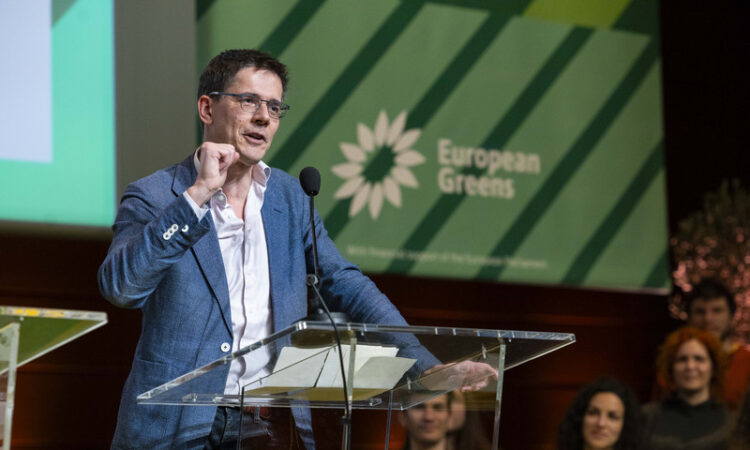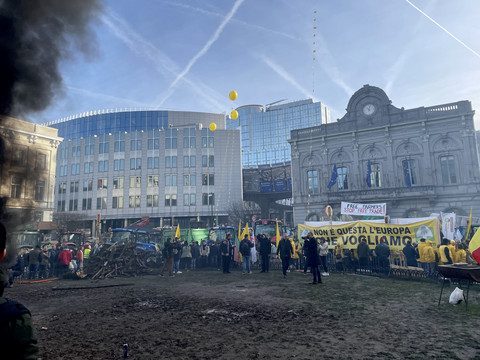
At their congress in Lyon over the weekend (2-4 February), Europe’s Green parties chose two veteran MEPs as their Spitzenkandidaten (top candidates) for the upcoming EU elections, German MEP Terry Reintke and Dutch MEP Bas Eickhout. Their election campaign comes amid protests from farmers in Europe claiming they are being squeezed by green regulations, free trade, and the cost of living crisis.
Earlier on Monday (5 February), the pair, along with other Green MEPs, sent a letter to senior EU officials, including EU Commission president Ursula von der Leyen, in the wake of recent delays and concessions, to signal that “short-term measures should not detract from the long-term systemic changes that are urgently needed”.
The Greens point out that easing environmental rules that protect the EU’s long-term food sovereignty is “nonsense”. Instead, they point to the overall difficulty of farmers trying to make a living from their work as the root of the problem.
“They are trapped in a system that is crushing them. The liberalisation of our agricultural markets does not work,” the letter says.
EUobserver sat down in Lyon with Eickhout, vice-chair of the environment committee in the European Parliament, which he joined in 2009, to discuss the farmers’ protests, as well as the challenges facing the Green Deal and the group’s priorities for the upcoming elections.
What’s the reason behind the election of two top candidates instead of one?
It all comes down to gender equality. We’ve seen too many boring men, as I said in my speech, also thinking of the German campaign, and so we wanted to ensure that there is always a woman in the race, and now there was even the possibility of two women. They still chose me [in the second round], but of course it’s to make sure we have a gender balance in our representation.
And from your point of view, why you? You were already elected to run as lead candidate in the last contest, in 2019.
At least, the conclusion is that I did a good job in 2019. Otherwise, I think they would not have re-elected me.
In all the years I’ve been in the European Parliament, I think I’ve always invested in really strengthening the green family across Europe. I’ve never been a politician who just sits in the ‘Brussels Bubble’, does one thing and then goes home. So I think that’s what a lot of people see.
I am known in the green family and that helps, but I also bring green credentials. I have worked in science before I went into politics, and I’ve worked on every green policy you can think of, and that’s a strong priority for us.
There has been what we could call a ‘regulatory fatigue’ when it comes to environmental policies, so how are you going to maintain or defend the Green Deal during the upcoming elections?
There are three very clear reasons why the Green Deal needs to be continued. First of all, the climate crisis has only got worse and every summer we talk about more climate extremes. And now we are going to campaign as if these extremes are not happening. And then what? In August, we’ll be talking about the floods, the droughts, the forest fires and so on. Nothing has changed. So the politicians who said this is crucial in 2019, where are you now? The climate hasn’t changed, you know? So that’s the first reason, because we haven’t solved the problem.
Secondly, the biggest problem for our industry, and I know some will say it’s bureaucracy and all that, but no. The biggest problem is that the investment money is not coming to Europe. And why not? Two reasons: we are fragmented and we are unclear about where we want to go. And those two things are not attractive to investors. And so the stupid thing you can do now is change a programme that you started in 2019 as a solution for a future economy. This is the problem of our industry. This totally unclear direction of where Europe is going. You have to stay the course, and that’s what the industry expects, because they’re going crazy with all these changes.
I think the third reason is that the world is changing. Look at what Joe Biden did with the IRA [the Inflation Reduction Act]. It could not be called green investment because then he could not get the Republicans on board. So it was called the Inflation Reduction Act, even though it’s got nothing to do with reducing inflation. It’s a pure-green investment programme.
And China is doing industrial policy. The electric car is the best example, where they are looking at the whole supply chain, investing in the batteries and really going there. And they are now becoming the biggest exporter of cars, so the world is changing. The green race is on, and at that moment you get conservatives that say ‘let’s pause’. While the world will not pause. And then the only way we can be competitive is on this innovation. We would stop that. It’s killing ourselves, so for me, it’s so clear that we need to continue this [the Green Deal].
How do you think the crisis facing European farmers should be addressed? You have been saying for a while now that the food system is not working for the majority of farmers [as 80 percent of the subsidies go to only 20 percent of the farmers], but most eyes are now on you, looking for someone to blame.
It will not be easy. We’ve seen that in the Netherlands as well, but I think there is also a big part of farmers who do understand something needs to change. Although if you are not ready for change, then of course you don’t like the greens, because we always bring a message of change. But the fascinating part is when we are looking at the agriculture debate, we are talking about farmers suicides on a daily basis, farmers stepping out of the business. We see that the number of farmers is going down already for decades. So basically we are in a system where no one is happy, and then the reaction is ‘let’s not move’, ‘let’s not change anything’. We can have a long discussion on what is the right answer, but for sure, not changing is not the answer. And I think this is where we as greens come in. We are ready to shape. We want to change the system.
On top of that, we can even show in our voting behaviour that we have not supported this agriculture policy and Mercosur, etc. but I think it shows kind of we want to change the system. So if you are open to change and you realise something needs to change, that’s the moment where you get shit together and then we can discuss. Because then of course, the biggest concern, as I said, is that where do the profits go? The profits do not go to the farmers, they go to the supermarkets. And that’s exactly the liberal system, the economic system that is failing farmers. Well, guess what? We want to change that economic system. So it’s not a one-liner, it’s a bit more of a complicated one, but, in the end, this is where also all the farmers do realise that something needs to change.
At the farmers’ protest in Brussels last week, there was a big banner saying ‘Stop Free Trade’. Is that the message you want European farmers to hear from you?
It’s not about closing the external markets. The problem with free trade is the way it’s being pursued now by the conservatives again, who are opening up the markets, which leads to an uneven playing field because the Brazilian farmer is not accountable for all the environmental legislation that you have in Europe. So, of course, the farmer who is already feeling the pressure, who is barely making a living, gets competition from outside, where he feels, how can I compete with that? And that’s why we’ve been fighting against these free-trade agreements. We fought against CETA, and all the conservative politicians signed CETA with Canada. Well, the big beneficiaries of that are the beef sector, the big players, not the farmers. So that has to stop.
This ideology of the conservatives that free trade will make us all better, I think it has been proven wrong so many times now. And this idea that we’re going to get a better economy, trickle down, we’re all going to benefit, it doesn’t happen. And it’s only putting the farmers even more back against the wall. That is why we are for a totally other [kind of] trade.
We will always have trade, right? I mean, Europe is dependent on resources and we can’t produce everything ourselves. We can produce more, but not everything. That is the way you have to look at these trade deals. They have to be sustainable in both directions, they have to be reciprocal. I think that’s our agenda. And in that sense you can sum it up with ‘no free trade’. I can subscribe to that.
Apart from the proposals to address the climate crisis, what other priorities will be in the Green agenda?
I think a key political agenda will be: will there be room for investment? And the big challenge is: will austerity come back to Europe?
You see in the research what austerity has done. It cut our social spending, so it killed our social welfare system, and exactly where it hit the hardest you see the rise of the far right. And there is a danger that austerity comes back because some of these conservative politicians are again saying ‘no, but, you know, budget discipline is the most important thing we need’. Sorry, in a world where we are in a global race, where we are going to reform our entire economy, and the same conservatives put the signature on climate neutrality in 2050, that means a completely different economy.
With Ukraine, a very unstable democracy on our borders, where we have to invest, where we know we have to be more self-reliant as Europe because we can’t rely on the United States like we used to. These are massive investment programmes. And if, on top of that, we say ‘oh, but we have to have austerity’, then we are really forgetting about the social fabric. That’s one of the biggest dangers when you talk about social Europe, the return of the austerity agenda, and let me be very clear: we will fight against that.







